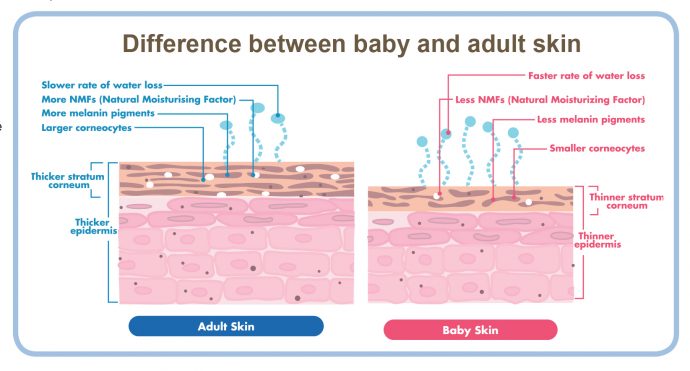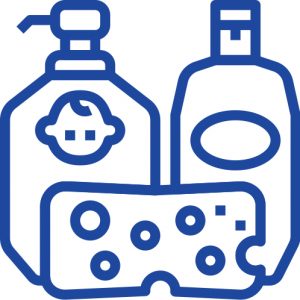Skin is the first sensory organ to develop in foetus. The newborn skin is not fully mature at birth as it lacks sebaceous and sweat glands. Infant skin continues to undergo the maturation process during infancy.
Some of skin functions include: (1) barrier to water loss, light, and irritants, (2) infection control, (3) protection from physical harm, (4) sense of touch, pain and temperature, and (5) regulating body temperature. Stratum corneum, the outermost part of epidermis, plays a vital role for the first function..
At birth, a newborn leaves the warm, wet, sterile, and safe womb to a cooler, dry, bacteria-laden environment. Newborn skin is critical to this transition. As it adapts to the new environment, there will be changes in skin hydration, water binding and acidity. The sense of touch also plays an important role in a child’s development. Mothers’ touch, hugs and kisses provide warmth and affection to babies, signalling they are safe.
Baby’s and adult’s skin: a comparison
Skin functions remain the same throughout life, but there are key structural differences between a baby’s and an adult’s skin. Baby’s skin has a thinner stratum corneum and epidermis (approximately 30% thinner than an adult’s). It also tends to experience higher transepidermal water loss (it absorbs more water, but also loses excess water faster). Baby’s skin also has less natural moisturising factors (NMFs), which bind water and keep the skin hydrated.
Other differences include baby’s high ratio of skin surface area-to-body volume and their immature drug metabolism system. These factors can cause baby’s skin to be dry, vulnerable to sunlight and heat, and more prone to allergy, irritation and infection.

Caring for baby’s skin
A baby’s sensitive skin needs extra care and attention.
- Bath time: It should be brief and not too often to avoid losing the natural oil protecting baby’s skin. Use low-irritant bath products in minimal amounts, rinse well, and avoid “over-bathing” that can lead to dry skin. Make sure the water is lukewarm. Apply baby lotion to retain his skin’s moisture after bath.

- Diaper change: The skin at diaper area is more irritable due to over- hydration, increased pH, friction and other factors. Check diapers frequently and change immediately if soiled, to avoid diaper rash. After cleaning, gently pat baby’s bottom dry before putting on a new diaper. Apply barrier creams, if there is diaper rash. Use alcohol-free wipes and high-absorbency disposable diapers for safe, effective, and gentler care at sensitive diaper area.

- Baby massage: With physical and emotional benefits, massage helps baby to relax, sleep better, and ease crying. Apply baby oil or lotion and gently massage his face, abdomen and limbs, while talking or singing to bond with him.

- Baby products: Choose baby-specific products, such as tear-free and allergen-free shampoos or lotions, and products that preserve the mildly acidic pH of baby skin. Be mindful of allergic reactions. Products made for adults (i.e. antibacterial products, deodorant, etc.) may be too harsh for baby’s skin.

Concerns on chemicals
Parents should identify the chemicals used in skin care products to make informed choices for their babies. Two common concerns are fragrances and preservatives.
- Fragrances can influence our mood and are used to enhance our experience when using certain products. They can stimulate the sense of smell, which is important in developing bonds between mothers and infants. However, fragrance allergies are quite common, so it’s important to choose products that have undergone extensive research in ensuring they are safe for infants.
- Preservatives prevent the product from being spoiled by microbes and extend its shelf-life. Low levels of preservatives are generally considered as safe, whereas baby products contaminated with microbes can cause serious infections if applied to immature
baby skin.
Parents need to understand product labels. If the baby has an allergy, look for allergen- free labels, not fragrance- free or unscented. Fragrance molecules are still present in the latter, but masked or neutralised with other chemicals. Parents also need to learn the correct product usage, in terms of the right dosage and application method.
When choosing baby products, be sure they are clinically proven and in strict compliance with standards regulations. Your baby’s skin is more sensitive and still immature, but it is one of the first ways he interacts with you and the world. This interaction is important for his development, so take extra care of his skin!







Comments